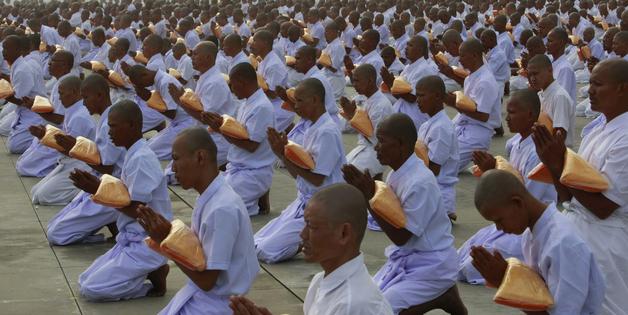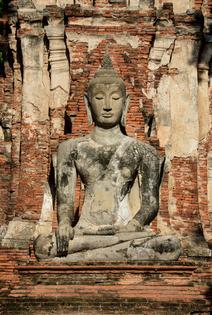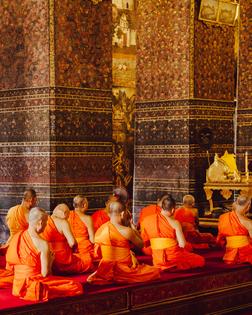Traditional Buddhist teachings exclude LGBTQ people from monastic life, but change is coming slowly
Published in News & Features
The symbolic image of the silently meditating nun or chanting monk often embodies the Buddhist religion. Such representation may make it appear that Buddhist teachings and practices are grounded in heterosexual norms. However, there is also plenty of discussion on the various expressions of human sexuality and sexual orientations in pre-modern Buddhist literature.
In contemporary debates about gender, nonbinary definitions in particular, have reached many countries where this ancient religion is practiced.
Gender and sexuality in Buddhism are central to my scholarship. And my research demonstrates that queer life in the context of traditional Buddhist monastic ordination appears to be slowly changing.
Monasticism, whereby individuals dissolve all secular ties and devote themselves to full-time study and religious practice, represents the highest ideal of a Buddhist community. By virtue of their dedication, nuns and monks become respected role models for the lay community and provide guidance in Buddhist practice. In return, the lay community offers material support to the monastic community.
The Buddhist ideal of enlightenment resists description in either language or logic, including its views on gender identities. The famous declaration in the first-century text “Vimalakīrti-nirdeśa Sutra,” “In enlightenment there is no male or female,” illustrates this point well.
Yet Buddhist teachings often arrange followers by male and female genders. The four pillars of the Buddhist community, or sangha – nuns or ordained female monastics, monks or ordained male monastics, laywomen and laymen – are arranged by gender. This gender structure also functions in monastic living arrangements: monks and nuns live, study and practice in separate quarters.
This framework holds true for public teachings as well. The seating arrangement puts monastics in front, with monks on one side and nuns on the other, and laypeople behind, also divided by gender. Those who do not fall into the gender category of man or woman cannot be neatly placed in this ideal Buddhist community.
One example of those who do not fit into the binary gender arrangement is a group of queer people called “paṇḍaka.” This Sanskrit term can be translated literally as someone “without testicles.” Another interpretation might be those who fail to conform to culturally expected masculine roles. A paṇḍaka could be someone who is impotent, either congenitally or periodically, or someone whose sexual desires are considered nontraditional. The term might also be translated as “queer.”
The attitude toward paṇḍakas, or queer people, in pre-modern Indian religions, including Buddhism, Hinduism and Jainism, was largely disparaging. They were feared for their seductive powers and were denied monastic ordination. Such accounts can be found in early Buddhist literature dating back over 2,000 years.
In fact, until now, to be accepted into the Buddhist monastic community, one had to meet a list of requirements, including unambiguous genitalia.
One concern regarding the inclusion of LGBTQ persons in the Buddhist community is that their nonbinary gender does not fit neatly into the fourfold structure of the sangha. Another might be anxieties about preserving the perceived purity and reputation of the celibate monastic order. Therefore, Buddhist orders emphasize creating and maintaining the monastic order as an ethically exemplary community capable of spiritual pursuits.
In Buddhism, the belief is that the fruits of one’s past moral actions are manifested in the body. The Buddha’s perfect body is said to be the result of his virtues. Traditional Buddhist texts teach that sexual expression and queerness bear ethical implications. To be sexually queer implies past negative karma, which is interpreted in some cases as ground for exclusion from a monastic life – but not from Buddhist practice in general.
References to LGBTQ Buddhists in pre-modern Buddhist literature are few and far between. These mainly take the form of injunctions against their ordination in the literature on Vinaya, the term for the discipline of Buddhist practitioners.
Despite being underrepresented in Buddhist monastic practices, LGBTQ Buddhists in the past few decades have worked to be included in these communities.
Some kathoey performers – kathoey being a term describing transgender women or gender-nonconforming gay men in Thailand – have received ordination in their sex assigned at birth. However, their ordination practice is not without controversy.
The Thai Sangha Council, the governing body of the Buddhist order of Thailand, tried to ban such practices in 2009.
Thai Buddhism is part of the Theravada tradition, practiced in Sri Lanka and a large part of Southeast Asia. Outside of Theravada and in Mahāyāna and Vajrayāna traditions, the prerequisite of having a cisgender identity for monastic ordination is changing.
A monk who was denied full ordination because of his queer identity in the Theravada tradition was accepted in the Tibetan Buddhist community in India. Michael Dillon, born as a girl, Laura, in West London in 1915, was rejected from attaining full ordination in the Theravada tradition after being “outed” as transgender. However, Dillon was reordained as a novice monk in the Tibetan tradition and promised a full ordination, although he died before that could happen. Dillon authored a short book on his struggle to change genders and be accepted within the Buddhist community; in it, he argued that Buddhist teachings should accommodate a more expansive definition of gender.
Other cases of transgender and queer monastics in the Tibetan Buddhist world include Tenzin Mariko, the first openly transgender Tibetan Buddhist. A former monk and a 2015 Miss Tibet contestant, Mariko is now an LGBTQ rights activist. She frequently cites her monastic training and the Buddhist teachings on kindness as her inspiration.
Tashi Choedup, a transgender Buddhist monastic, also talks about experience of his teacher not inquiring about their gender identity, as prescribed by the Vinaya, during his ordination. Choedup attended an inclusive Buddhist monastic institution that did not enforce rigid gender divisions. Choedup now works to build awareness and inclusivity for the transgender Buddhist community.
The dogmatic interpretation of membership in the monastic community that limited the kathoey monastics and Dillon’s quest for ordination appears to be changing. The experiences of Mariko and Choedup represent progress and hold the promise of a wider institutional change.
This article is republished from The Conversation, an independent nonprofit news site dedicated to sharing ideas from academic experts. It was written by: Jue Liang, Denison University. The Conversation has a variety of fascinating free newsletters.
Read more:
A scholar of the Middle East explains Iran’s morality police and their history
Has the modern world discovered the ancient truths of Buddhism or simply invented a new version?
Jue Liang does not work for, consult, own shares in or receive funding from any company or organization that would benefit from this article, and has disclosed no relevant affiliations beyond their academic appointment.













Comments